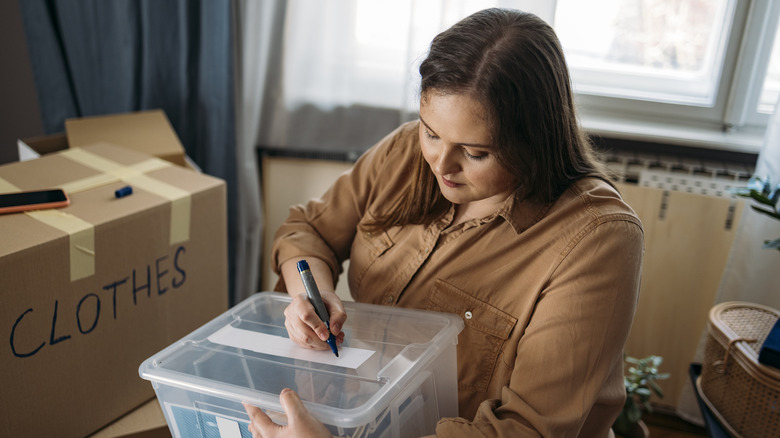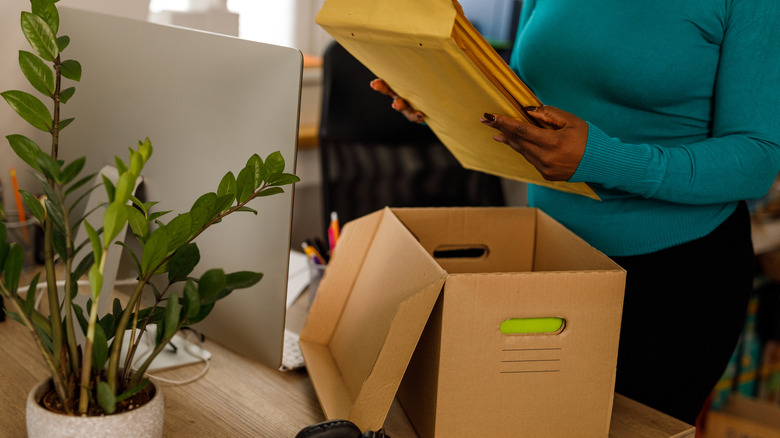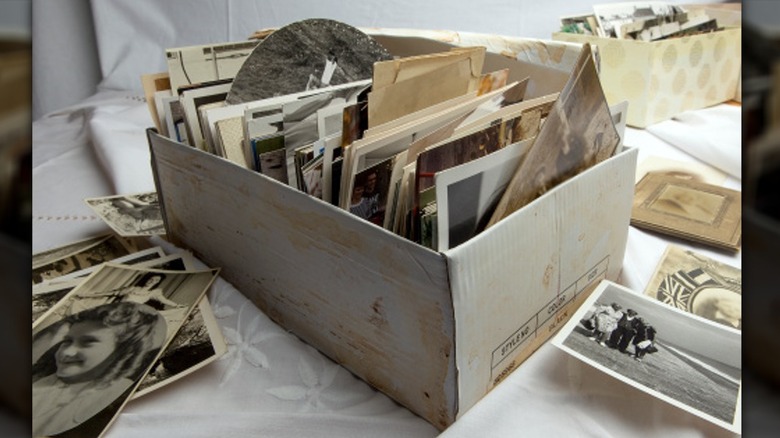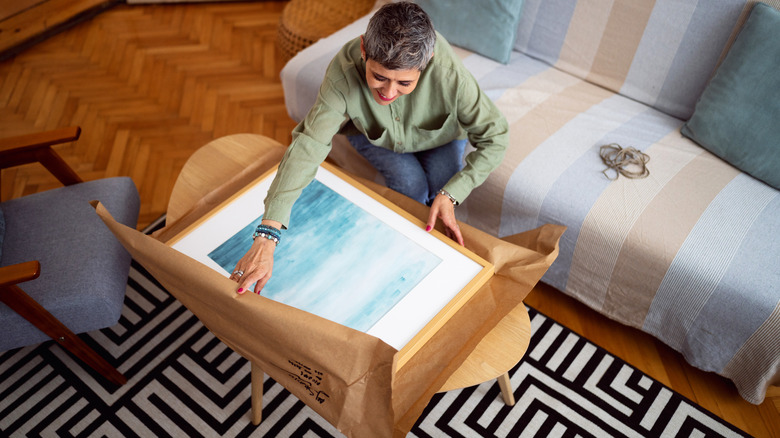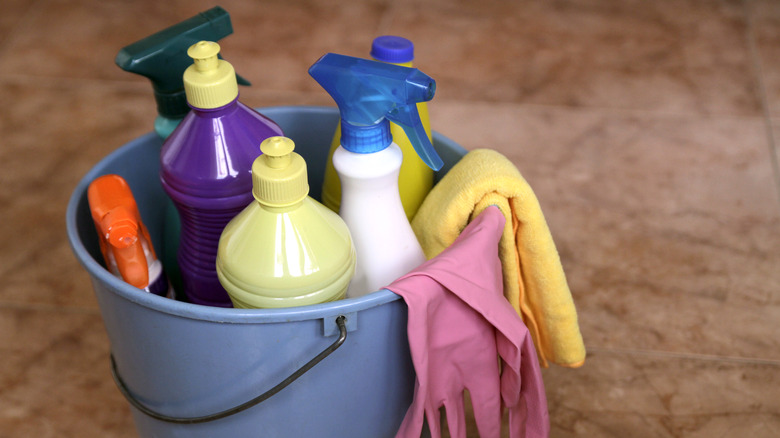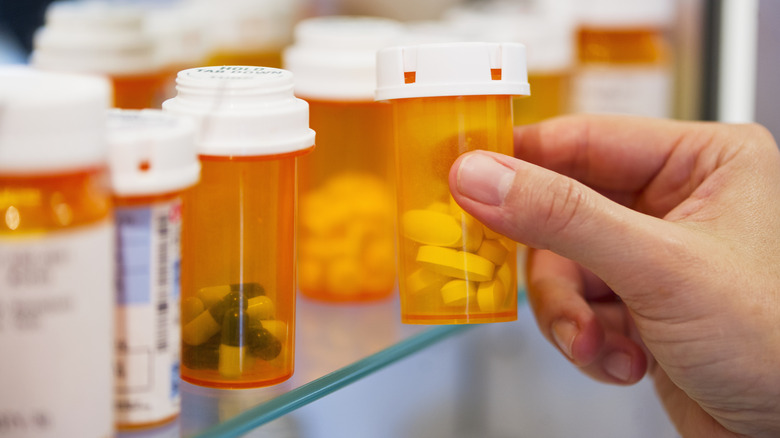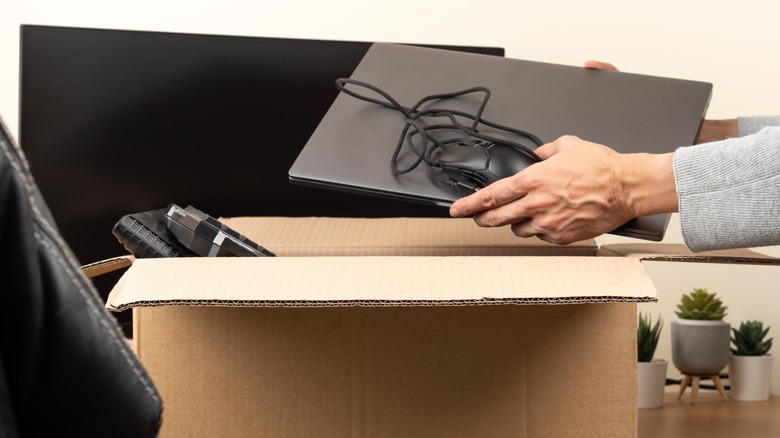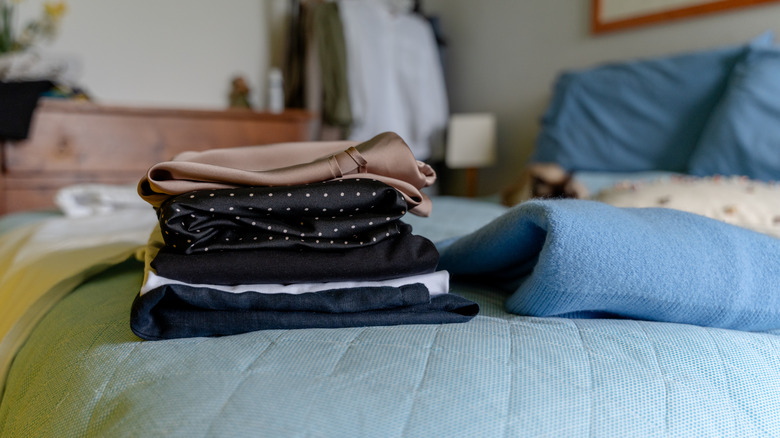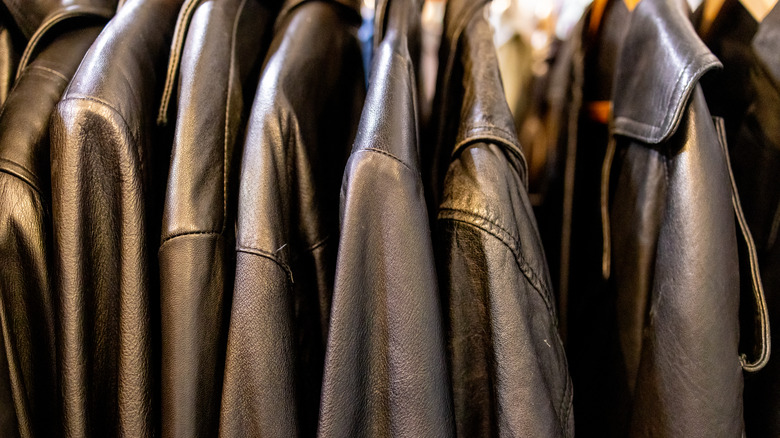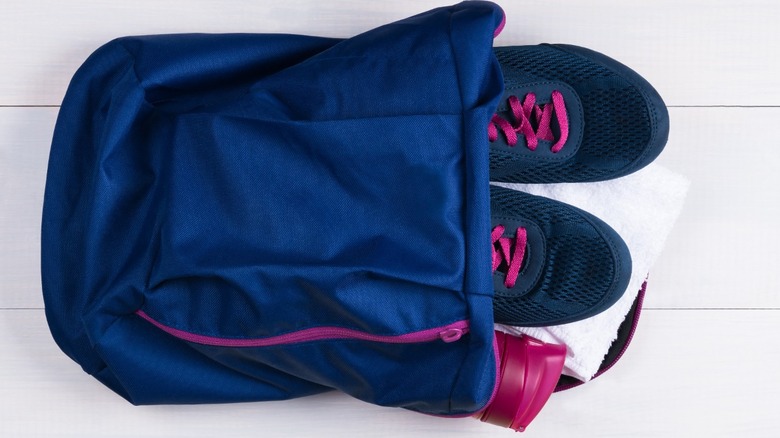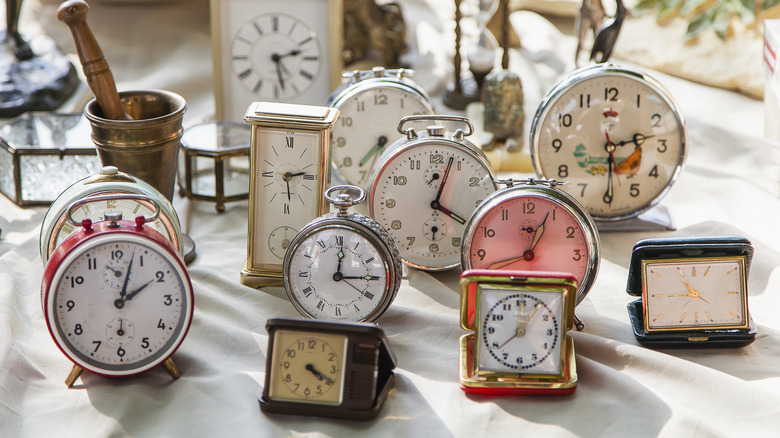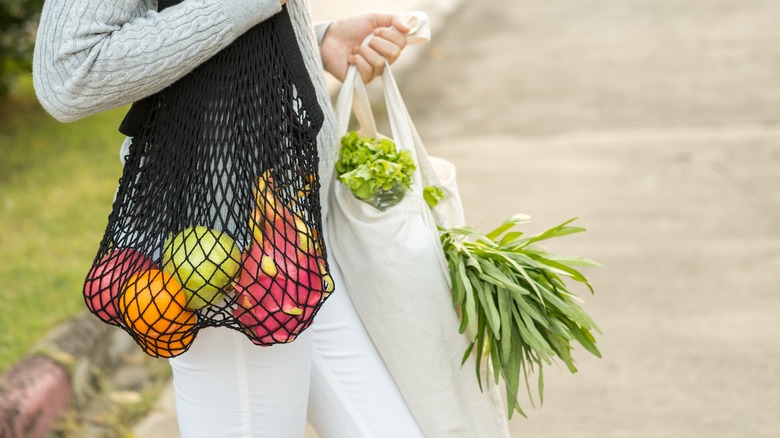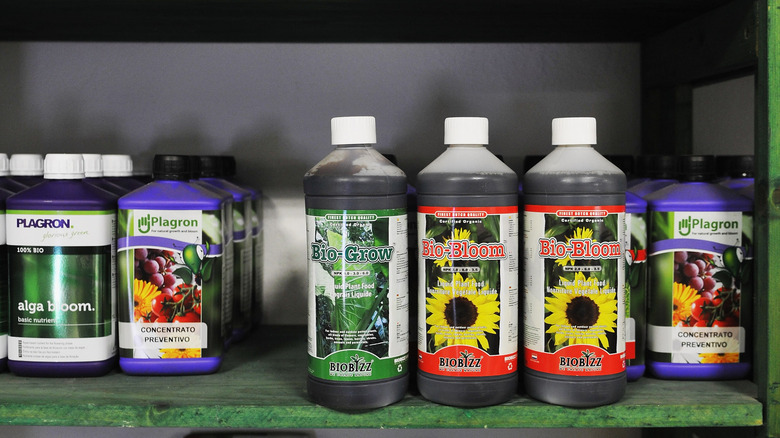12 Common Items That You Should Never Store In Plastic Containers
We may receive a commission on purchases made from links.
When you think about home storage, you probably think about clear plastic bins and tubs. They are easy to get, easy to handle, and long-lasting. Plastic storage bins are pretty cheap, too, so it's convenient to just get a bunch and be done with it. However, plastic storage containers don't work with everything you might be storing away, so you should be careful with how you use them. Some items, like clothes, shoes, art, files, and antiques, won't get the air they need to maintain their quality if you store them away in plastic containers, so you need to consider better alternatives.
It's also better to get storage solutions that are designed to solve the specific problem you have instead of using generic ones. While it's tempting to throw everything into plastic bins, some common items are too fragile or their materials don't fare well when packed in an airtight space — like medicine and electronic devices. If you're using plastic bins to declutter your home, make sure you read on to learn about some common items you should never store in plastic containers.
Paper files and documents
Think again before storing your documents in plastic containers. They will be at risk of being damaged if any heat or moisture gets in. The plastic traps it completely, and any paper items stuck inside can get moldy or disintegrate. That's obviously a big problem with work files, certificates, personal identity documents, tax information, insurance paperwork, or sentimental newspaper clippings. Documents can even fade if the container is clear and it's left out in the sun for too long. Instead of plastic containers, consider storing documents in filing cabinets or within fabric, wire, or cardboard boxes.
Photographs and negatives
Photographs shouldn't be stored in plastic things like bins or sleeves either, especially if they are old photos or negatives. If it ever gets humid in the container, the photos can stick together, develop mold, or the images can warp and change. If the humidity gets too low, they can shrink or get brittle. It's better to store your photos in archival storage boxes specially made to preserve such delicate items. Look for an acid-free product, like this Lineco box from Amazon, which comes in different colors and starts from about $23 for the smallest size.
Artwork made of paper or fragile materials
Like documents or photographs, artwork is sensitive depending on how it's made and the materials used, so store your art carefully. The main consideration is the material that actually comes in contact with the piece, so avoid putting plastic sleeves directly against paper drawings and paintings because condensation can get into them. Use them only for short-term storage and transport, like if you're selling a piece. Long-term storage solutions require you to wrap dry paintings and artwork on paper in tissue or glassine first before storing in folders, cardboard boxes, or plastic containers.
Cleaning products
Plastic shouldn't be your go-to container type for cleaning products like bleach, ammonia, and liquid cleaners that include strong chemicals. If the plastic gets hot, that exposure to extreme heat will affect the quality of the substances. Any leaks or bottles that break or are left open can also be hazardous if left in the plastic, since those chemicals in the substances can react with the plastic and let off dangerous fumes. Opt for glass and metal containers instead. Also, avoid transferring such cleaning liquids into plastic containers and instead leave them in their original bottles.
Certain medications
It's crucial for medications to be stored in the right place and under proper conditions so they maintain their efficacy. Some need to be refrigerated, some need to be in room temperature, and none should be left in the sun — so don't store them in a plastic container in the wrong environment. Get a climate-controlled medicine container or choose a climate-controlled storage environment. Also, avoid transferring medicine from the original packaging into plastic containers, like ziplock bags. Be sure to check your medicine's expiration date, too.
Electronic devices
Plastic containers can a problem for electronics, which will be damaged if the container gets hot or wet, especially if they aren't well-made. Throw in some silicone gel packets for good measure. Make sure the room is climate-controlled and moisture doesn't get into the container — avoid storing electronics in the basement or in an outdoor shed! Rather than plastic, you could also use cardboard boxes or boxes specially made for the device you have. For example, "dry" or moisture-proof boxes for cameras will maintain an ideal humidity level. They're pricey, though — Ruggard's cheapest dry box costs about $98.
Delicate fabrics
If you've decided to try the ripening drawer trick to declutter your closet, you are probably looking for a place to keep those things and might be considering a standard plastic storage bin. Delicate fabrics, however, are another class of item that you should never store in plastic containers. Materials like silk don't do well in airtight spaces and will be susceptible to damage due to any heat or moisture. We recommend felt bins, woven baskets, and open fabric cubes instead for your clothes, sheets, and other fabrics in delicate materials because they will allow them to breathe.
Leather items
Leather is a premium material that needs careful handling with either short- or long-term storage. Leather is sensitive to heat and moisture, so it's important to avoid materials that can trap these in, like cling film or plastic bins. When things like leather belts, wallets, or jackets are exposed to heat or humidity, they can crack, dry out, or develop mold. Consider wrapping your items with protective wrapping paper to allow them to breathe and stay dry. Cotton garment bags and dust covers, like this set for about $27 on Amazon, are another option.
Shoes made of delicate materials
Shoes in delicate materials like leather, suede, velvet, and satin also shouldn't be kept in plastic vessels. They are best kept where they can be receive air. Store them in the boxes they came in or get a container made of a breathable material like mesh or fabric. The $18 HEMMAFIXARE from IKEA is a good example of this because it is a storage case made of soft fabric. Tougher materials like rubber, foam, and plastic can be stored in plastic, but they should be cleaned and freshened first so they don't get musty.
Antiques
When dealing with antiques, you're working against time to maintain the quality of something that's aged and is very fragile as a result. Plastic isn't a good match with antiques because it can trap moisture and affect their materials. With antique furniture, wrap them in breathable materials like cloth instead of plastic wrap. Trinkets, books, clothes, and other fabrics can go in small boxes, so wrap them in acid-free paper or newspaper based on the item and store them in fabric cubes. We like this gray Voova fabric cube three-pack sold on Amazon for $36.
Fresh-picked produce
Just had a harvest of fruits or vegetables in your home garden? Avoid stuffing them in the nearest plastic container. Fresh produce needs to breathe, and a plastic wrap or bag will suffocate it, causing it to rot faster. Opt for something else like a paper bag or a cloth bag like muslin. Potatoes and onions fare best when stored in mesh bags. Cotton mesh bags, like these reusable and washable ones on Amazon, are a good option. You can keep your produce in them and also take them shopping. A large three-pack costs about $13.
Chemicals
Any products you have at home that contain chemicals shouldn't be stored in plastic containers due to the airtight atmosphere and the risk of them spilling in the container. These could be pesticides, herbicides, fertilizer, chlorine for your pool, or personal care products like nail polish remover. They are hazardous materials and should be in well-ventilated spots where they can stand on their own and avoid mixing with others. For example, fertilizer bags can be left out in the open on shelves wooden pallets, while pesticides are best in a locked cabinet.
